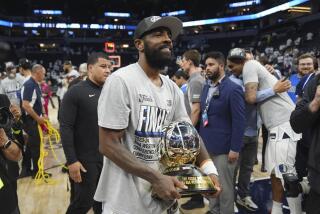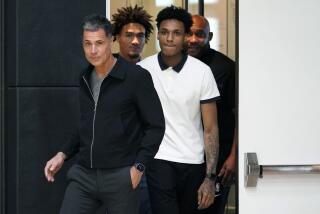A Crossroads for Patrick Ewing, Knicks? : Basketball: After six seasons and a woeful playoff exit, star center says he will consider his options--including free agency.
- Share via
NEW YORK — Patrick Ewing weighed every word. They were heavy words, full of consequence. He had said earlier in the season that if the New York Knicks didn’t demonstrate some sort of commitment to winning, if management didn’t stop this revolving door of coaches and general managers and get some bona fide players, he just might decide to become a free agent and terminate what we all thought would be a lifetime relationship with the Knickerbockers.
So what now? What will he do now that the Knicks have been eliminated, humiliated, swept from the NBA playoffs in a first-round set that was never even competitive? What now, having been jeered and booed in Madison Square Garden after a woeful effort in Game 3? What now, with Coach John MacLeod on the way out and new president Dave Checketts bringing yet another new philosophy? They sang “Goooood-bye Patrick,” in the Garden for heaven’s sake, so what now? Will he remain a New York Knick?
“I haven’t made up my mind yet,” Ewing said, sounding somewhere between confused and depressed. “It’s been a disappointing, long, frustrating year. I’m going to sit down and talk to my wife and my lawyers and make a decision. Timetable? By the end of the month. I’ll decide something by that time.”
He wasn’t kidding or joking or using the media to negotiate an additional million or two. The next time Patrick Ewing puts on an NBA uniform he will start his seventh season, which means his career is about half over. The Knicks, in his six seasons, have had five coaches (Hubie Brown, Bob Hill, Rick Pitino, Stu Jackson and MacLeod) and four men charged with running the team day-to-day (Dave DeBusschere, Scotty Stirling, Al Bianchi and now Checketts). The only significant personnel decisions (Charles Oakley in for Bill Cartwright and Will Perdue; Rod Strickland out for Maurice Cheeks; a first-round draft choice gone for Kiki Vandeweghe; and Johnny Newman let go to Charlotte as a free agent) were bad ones. The Knicks are a joke.
Ewing wants to seriously contend for an NBA championship, and that might not be possible if he stays in New York.
“I’m trying to be careful about what I say because we just lost to Chicago and I’m very frustrated about it,” he said. “I thought I would always be a part of the Knicks. ... I thought we had turned the corner two years ago with Rick (Pitino) when we won 52 games. Things were on a high, there was excitement in the Garden. Then it just went bad, as quickly as it had changed for the better. ... Right now, I just don’t know. I haven’t made up my mind.”
As depressing a season as it was for him, Ewing probably will never have more leverage than he has now. On June 1 he will become a restricted free agent. Yes, he signed a 10-year contract when he came out of Georgetown in 1985, but ProServ’s David Falk structured it so that Ewing had a “termination clause” that could be triggered after six years if Ewing wasn’t one of the four highest-paid players in the game.
If Ewing exercises that clause, he becomes a restricted free agent, meaning the Knicks could keep him by giving him a 25 percent raise on his $6 million salary. He could play that one year for the Knicks and then walk, as an unrestricted free agent, if the club couldn’t satisfy him with a long-term deal.
Of course, the Knicks wouldn’t let that happen. They’d have to get something for him, some combination of draft picks and players. But Ewing holds the upper hand there too. Let’s say the Knicks want to work a deal with Team X, but Ewing doesn’t want to go there. He can’t veto the trade exactly, but he can let Team X know he won’t sign after that one season, meaning Team X would have parted with players and draft pick(s) for one rent-a-season from Ewing, who would still become a free agent.
The word is that Ewing wants an average of $7 million a season. The Knicks have to ask themselves whether they think he’s worth it. He has improved to the point where he is in or near the top five in all the right categories, including (finally) rebounding. Still, if the Knicks can’t get past the second round with him after six seasons, perhaps it’s time to get as much as they can for him in the trade market and try another approach.
Fewer and fewer teams are relying on the old-style low-post center. If Jordan is injured the Bulls die. Same goes for Magic and the Lakers, Bird and the Celtics, Isiah and the Pistons. None is a center, all control the ball and the game. Center Hakeem Olajuwon was injured and the Rockets flourished. Coincidence? Maybe not.
But NBA Commissioner David Stern understands the importance of having a strong franchise in New York. Checketts worked for Stern. Asked Wednesday what management could do to demonstrate that stability is forthcoming, Ewing frowned and said, “I really don’t know, but I think Checketts, from what I’ve seen, has done a lot of good things ... “ Checketts is trying to use this honeymoon period to build a strong relationship with Ewing and has indicated that signing him is a priority.
A growing number of people think Ewing is positioning himself, telling the Knicks he wants to be consulted on major club decisions, just as Jordan, Magic, Bird and Thomas are. Those who think it’s a financial ploy ignore the fact that no other team can pay Ewing as much as the Knicks, who can use the complicated salary cap in their favor simply because he’s already on the team.
Over and over, Ewing said he wants to see proof of commitment from the club. “Anybody who knows me knows I want to win,” he said. “More than anything else I want to win.”
There are several places where that can happen. Washington, Ewing’s home, is one of them as long as the Bullets don’t have to give up the few valuable players they have to get him. At one point, it seemed a pipe dream that Ewing would actually be available. By the end of the month, he may know the identity of the Knicks’ new coach, and he may be satisfied that the club is moving with some urgency in the direction of contention. Or he could decide that the only way to pursue a championship is to initiate the divorce proceeding.
More to Read
Go beyond the scoreboard
Get the latest on L.A.'s teams in the daily Sports Report newsletter.
You may occasionally receive promotional content from the Los Angeles Times.










